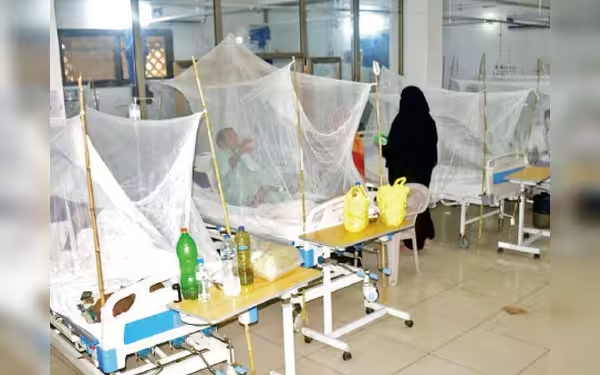Saturday, November 16, 2024 05:50 PM
Dengue Cases Surge in Rawalpindi Amid Monsoon Season
- 14 new dengue cases reported in Rawalpindi in 24 hours.
- Health officials urge public to eliminate standing water.
- Awareness and prevention are crucial to combat dengue.
 Image Credits: tribune.com.pk
Image Credits: tribune.com.pkDengue cases surge in Rawalpindi with 14 new infections reported. Health officials stress the importance of prevention and public awareness.
The recent surge in dengue cases in Pakistan has raised significant concerns among health officials and the general public alike. Dengue fever, a viral infection transmitted by mosquitoes, tends to spike during the monsoon season when stagnant water provides ideal breeding grounds for these pests. As the rainy season progresses, the risk of dengue outbreaks increases, making it crucial for communities to remain vigilant.
In Rawalpindi city, alarming reports indicate that 14 new cases of dengue were confirmed in just the last 24 hours. This marks the highest number of cases reported in a single day this season, prompting medical experts to sound the alarm. The rapid increase in cases highlights the urgent need for preventive measures and public awareness to combat the spread of this disease.
Health authorities are urging residents to take necessary precautions, such as eliminating standing water around their homes, using mosquito repellents, and wearing protective clothing. Community engagement is vital; local leaders and health workers must work together to educate the public about the symptoms of dengue and the importance of seeking medical attention promptly.
As the monsoon season continues, it is essential for everyone to remain informed and proactive. Dengue fever can lead to severe health complications if not treated in time, making awareness and prevention key to safeguarding public health. By taking simple steps, individuals can help reduce the risk of dengue transmission in their communities.
The recent spike in dengue cases serves as a stark reminder of the challenges posed by seasonal diseases. It is imperative for citizens to stay alert and take action to protect themselves and their families. Together, through awareness and collective effort, we can combat the spread of dengue and ensure a healthier future for all.













